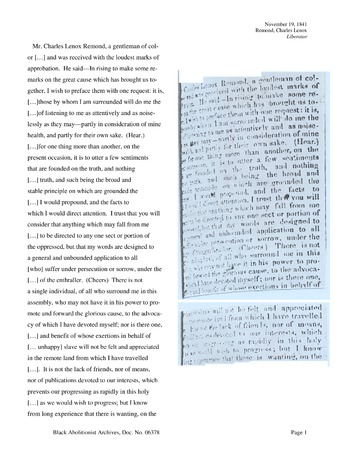
Speaker or author: Remond, Charles Lenox, 1810-1873
Newspaper or publication: Liberator
Speech given before a meeting of the Hibernian Anti-Slavery Society regarding the continued injustices and horrors of American slavery, and how this is perceived by people in other countries.
Description of file(s): PDF 19 page, 5,634 word document (text and images)
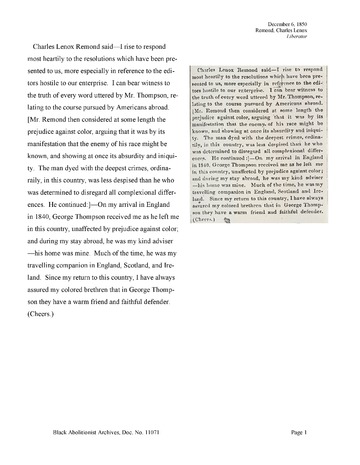
Speaker or author: Remond, Charles Lenox, 1810-1873
Newspaper or publication: Liberator
Continuation of welcome to George Thompson (see speech 11054) upon his visit to Boston. The speaker stressed that prejudice was the "chief enemy of his race" and that he was unaffected by prejudice while in Great Britain.
Description of file(s): PDF 1 page, 198 word document (text and image)
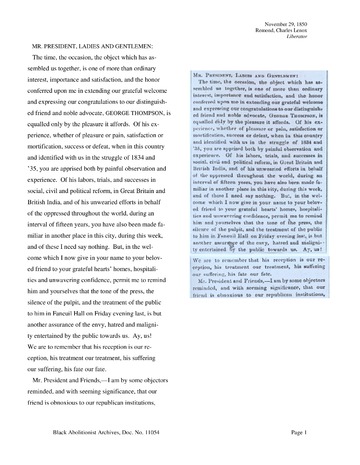
Speaker or author: Remond, Charles Lenox, 1810-1873
Newspaper or publication: Liberator
Speech welcoming George Thompson (who was instrumental in the emancipation of the British West Indies) to Boston. The speaker stressed the differences in public understanding and response to heritage and racial prejudice.
Description of file(s): PDF 3 page, 822 word document (text and images)
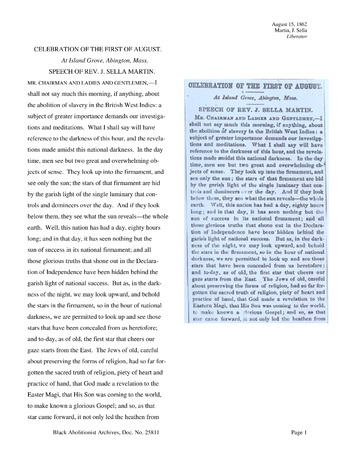
Speaker or author: Martin, J. Sella (John Sella), b. 1832
Newspaper or publication: Liberator
Sermon delivered during a celebration of the anniversary of the emancipation of the British West Indies. The speaker emphasized the error in moral judgment made by a country that condoned laws like the Fugitive Slave Law. He compared the plight of the slaves in the U.S. with that of slaves in ancient Egypt. He noted that the poor whites were not treated any better than the slaves were regardless of their skin color. The war for freedom was, to the speaker, a holy war for human liberty.
Description of file(s): PDF 15 page, 4,523 word document (text and images)
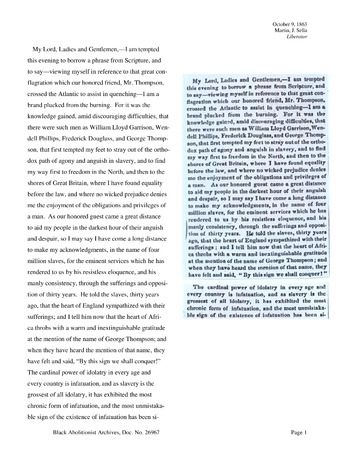
Speaker or author: Martin, J. Sella (John Sella), b. 1832
Newspaper or publication: Liberator
The speaker appealed to the people of Great Britain for their support in the fight for emancipation in the U.S. He explained a bit of what was happening in the U.S. regarding the war, and focused on the issue of slavery and the strides being made by the anti-slavery movements there.
Description of file(s): PDF 14 page, 4,006 word document (text and images)
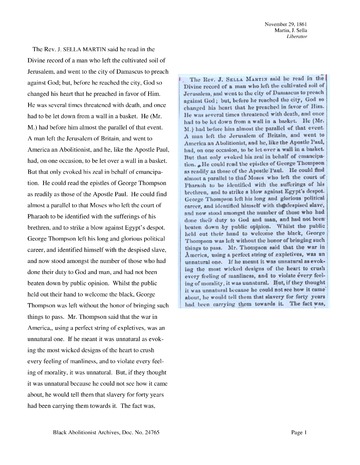
Speaker or author: Martin, J. Sella (John Sella), b. 1832
Newspaper or publication: Liberator
The speaker praised George Thompson for his accomplishments on behalf of African Americans. He compared the treatment of the slave in the northern states with the treatment of the slave in the southern states and concluded that African Americans were treated better in the south.
Description of file(s): PDF 3 page, 711 word document (text and images)
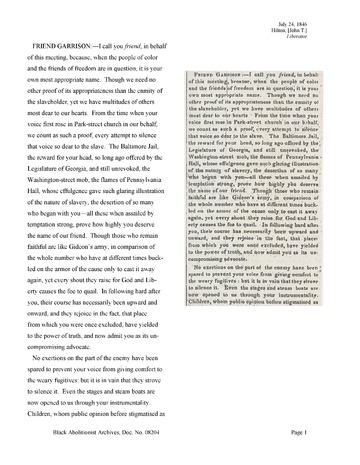
Speaker or author: Hilton, John T.
Newspaper or publication: Liberator
Speech praising the work of William Lloyd Garrison and George Thompson in the cause of the abolition of slavery.
Description of file(s): PDF 3 page, 726 word document (text and images)
spe.pdf.jpg)
Speaker or author: Paul, Nathaniel, 1792 or 3-1839
Newspaper or publication: Liberator
Speech given before the Glasgow Emancipation Society recognizing the society's accomplishments and encouraging them to continue their efforts towards emancipation.
Description of file(s): PDF 7 page, 1,580 word document (images and text)
spe.pdf.jpg)
Speaker or author: Nell, William C. (William Cooper), 1816-1874.
Newspaper or publication: Liberator
Speech delivered to welcome home William Wells Brown who returned from England a free man after being rescued from slavery and fugitive status by "British philanthropy."
Description of file(s): PDF 2 page, 570 word document (text and images)
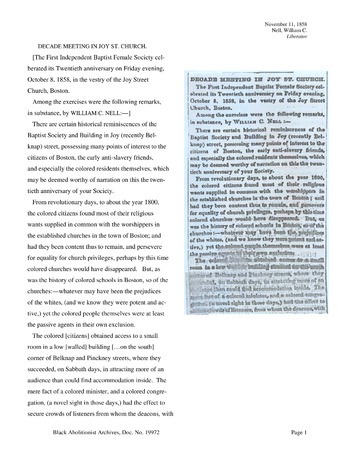
Speaker or author: Nell, William C. (William Cooper), 1816-1874.
Newspaper or publication: Liberator
Speech delivered during the celebration of the 20th anniversary of the First Independent Baptist Female Society and the church where their meetings were held. The speaker gave an overview of the history of the church and parish, and the accomplishments of the organization.
Description of file(s): PDF 6 page, 1,493 word document (text and images)
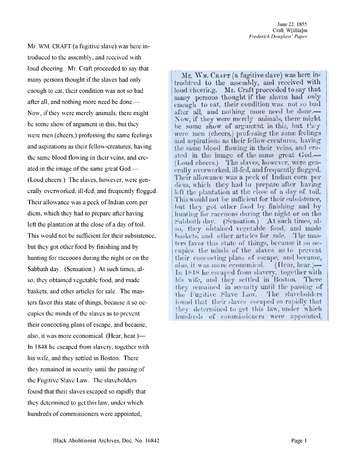
Speaker or author: Craft, William
Newspaper or publication: Frederick Douglass' Paper
Speech denouncing the Fugitive Slave Law and emphasizing its injustices. The speaker recounted his experiences with this law.
Description of file(s): PDF 3 page, 662 word document (text and images)

Speaker or author: Brown, William Wells, 1814?-1884
Newspaper or publication: Bristol Times
Anecdotal speech given before a meeting on American slavery held in Bristol, England. The speaker recounted stories from his life and the lives of others who had experienced the cruelties of slavery. He spoke of the injustices of slavery, and stressed the importance of the support of the British people in the abolition of slavery in the U.S. (Includes MP3 audio file.)
Description of file(s): PDF 3 page, 995 word document (text and images)
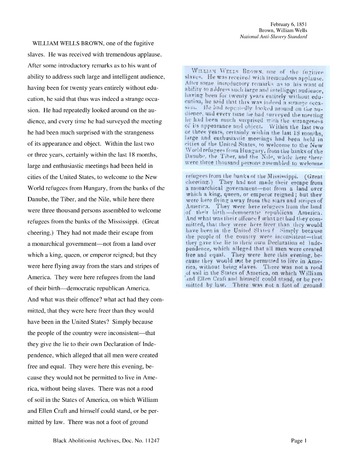
Speaker or author: Brown, William Wells, 1814?-1884
Newspaper or publication: National Anti-Slavery Standard
Speech denouncing the Fugitive Slave Bill, and stressing the horrors and cruelties of slavery in the U.S. The speaker emphasized the joy in the freedom he found in Glasgow and all of Great Britain.
Description of file(s): PDF 5 page, 1,537 word document (text and images)
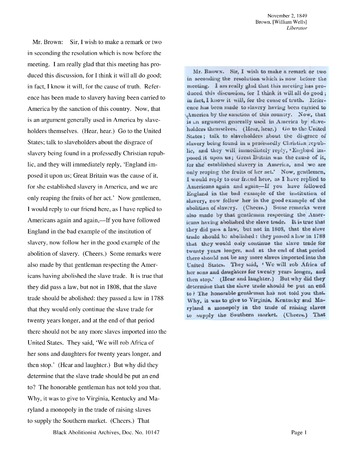
Speaker or author: Brown, William Wells, 1814?-1884
Newspaper or publication: Liberator
Speech regarding England's contribution to the institution of slavery in the U.S. The speaker emphasized the irony of continued slavery even after the slave trade had been outlawed. He noted that some slaveholders inherited slaves from their parents, and continued using "domestic" slave labor even though it was against the law to bring more slaves into the country. England was blamed for starting it, but the U.S. had to be held accountable for continuing this practice.
Description of file(s): PDF 7 page, 2,001 word document (text and images)

Speaker or author: Brown, William Wells, 1814?-1884
Newspaper or publication: North Star
Speech given before a large gathering in Newcastle, England regarding the current condition of abolitionists in the U.S. The speaker notes the irony of the realization that England is the true "home of the brave and land of the free." He praises the work and help of the Quakers and abolitionists in the struggle for freedom taking place in the U.S. (Includes MP3 audio file.)
Description of file(s): PDF 3 page, 455 word document (text and images)

Speaker or author: Brown, William Wells, 1814?-1884
Newspaper or publication: North Star
Speech given during a public meeting in London illustrating the cruelties and injustices of American slavery.
Description of file(s): PDF 4 page, 973 word document (text and images)

Speaker or author: Brown, William Wells, 1814?-1884
Newspaper or publication: Liberator
After reading aloud an advertisement for the sale of a slave mother and her children to be held on the 4th of July, the speaker emphasized the irony in the popularity of this date for such sales. He noted that slaveholders often chose holidays for such sales since they would be assured more buyers. The July 4th holiday was a particular favorite for sales like this. (Includes MP3 audio file.)
Description of file(s): PDF 4 page, 1,115 word document (text and images)
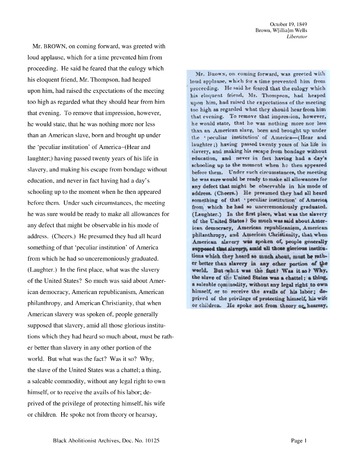
Speaker or author: Brown, William Wells, 1814?-1884
Newspaper or publication: Liberator
Speech delivered before a large meeting in London regarding the status of the anti-slavery movement in the U. S. The speaker was responding to another speaker who insisted that the free people of color living in the eastern states had a better life than those enslaved in the south.
Description of file(s): PDF 6 page, 1,788 word document (text and images)



